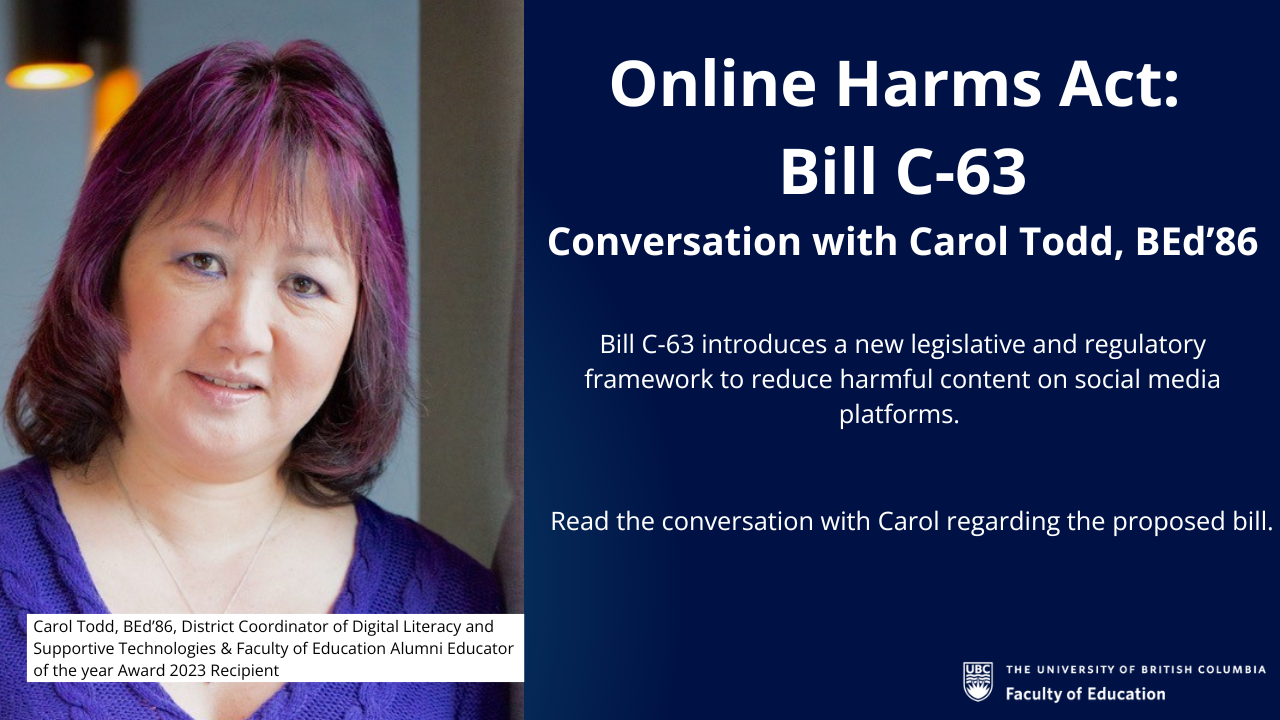Online Harms Act: Bill C63
Conversation with Carol Todd
An alumna within the Faculty of Education is issuing the following statement on the Online Harms Act: Bill C63. The statements do not represent the views of UBC, or any of its departments or other constituent units and the members issuing this statement recognize that there are or may be dissenting viewpoints within the unit.
The main purpose of the Online Harms Act is that it aims to:
- Promote the online safety of individuals in Canada.
- Reduce harms caused by harmful content online.
- Ensure that operators of social media services are transparent and accountable regarding their duties under the Act.
Bill C63 will give teachers and families a range of online safety conversation topics to talk about (such as exploitation, consent, screen time, cyberbullying, etc) with kids. These conversations about the digital world we work and play in are part of the Digital Literacy (DL) teachings that are essential in both homes and schools. Educators will need to find resourceful ways to teach DL to their students and be mindful of what to teach and how to teach it so that students will listen and learn attentively. So many students feel as if they already know how to be safe online when realistically, they often don’t. Being safe online also comes with active knowledge about personal safety and child abuse prevention tools.
If passed, this act would give increased tools for law enforcement to act on reported crimes that happen online. If there was a reported offence related to child sexual abuse material (CSAM), this bill would "Extend the period of preservation of data related to a child pornography offense to one year, as opposed to the current 21 days. To help facilitate investigations, extend the limitation period for the prosecution of an offense from 2 years to five years to ensure perpetrators can be brought to justice.", thus allowing law enforcement more time to follow through on a more complete investigation.
Currently, many countries are addressing these problems on various social media platforms and the emotional and physical harm they may cause to children.
Some of these harms may include:
- Mental Health Effects: Depression and Anxiety
- Negative Impact on Daily Life: Distraction and Sleep Disruption
- Quality of Information: Biased or Incorrect Information
- Social and Emotional Consequences: Cyberbullying and Social Isolation
- Behavioural Changes: Judgement of Others and Sensory Overload
The Online Harms Act (Bill C63) addresses seven focal points that would lead to the above impacts.
- Content that sexually victimizes a child or re-victimizes a survivor
2. Content that incites violent extremism or terrorism
3. Content that incites violence
4. Content that foments hatred
5. Content used to bully a child
6. Intimate content communicated without consent, and
7. Content that induces a child to harm themselves.
Online Harms Act: Bill C63
Conversation between Carol Todd and the Office of the Minister of Justice and Attorney General of Canada
An alumna within the Faculty of Education is presenting the following conversation on the Online Harms Act: Bill C63. The statements do not represent the views of UBC, or any of its departments or other constituent units and the members issuing this statement recognize that there are or may be dissenting viewpoints within the unit.
While there isn’t a specific provision in the Criminal Code that addresses cyberbullying or bullying more generally, bullying captures a wide range of behaviours, most of which do not amount to criminal conduct, for example, name-calling, teasing, belittling and social exclusion. However, where bullying behaviour reaches the level of criminal conduct, the Criminal Code contains several provisions that can address this behaviour. Depending on the nature of the activity involved, several Criminal Code offences may apply to instances of bullying or cyberbullying, including:
- criminal harassment (section 264)
- uttering threats (section 264.1);
- intimidation (subsection 423(1)),
- mischief in relation to data (subsection 430(1.1));
- unauthorized use of computer (section 342.1);
- identity fraud (section 403);
- extortion (section 346);
- false messages, indecent or harassing telephone calls (section 372);
- counselling suicide (section 241);
- defamatory libel (sections 298-301);
- incitement of hatred (section 319); and,
- child pornography offences (section 163.1).
These offences all already exist in the Criminal Code. Behaviours related to bullying and cyberbullying that would fit under the criminal code can be reported to law enforcement.
About Carol Todd, BEd’84
 Carol has consistently incorporated equity, diversity, and inclusion into her practice, ensuring that every student and educator feels valued and heard, regardless of their background, race, or gender. She has passionately promoted and advocated for more awareness around online safety and exploitation, working closely with provincial organizations, community partners, students, and families to create lasting change.
Carol has consistently incorporated equity, diversity, and inclusion into her practice, ensuring that every student and educator feels valued and heard, regardless of their background, race, or gender. She has passionately promoted and advocated for more awareness around online safety and exploitation, working closely with provincial organizations, community partners, students, and families to create lasting change.
In Carol’s current role as District Coordinator of Digital Literacy and Supportive Technologies, she provides exceptional consultative and direct support to all schools in assistive and accessible technologies. Additionally, she supports teachers on instructional strategies, assessment, and individual education plans (IEP) development for students while engaging and collaborating with other district professional personnel in meaningful, supportive ways.
The role of advocates is often essential to ensure challenges and needs are recognized, and Carol’s hands-on approach is fundamentally different than others. She helps everyone with their “next step” to learn and grow together, all in the interest of better-supporting children so that they have the best possible preparation to both succeed educationally and, more importantly, be safe and positive contributors to our society.
She was also honoured as the recipient of the 2023 Alumni Educator of the Year Award by the UBC Faculty of Education, in recognition of her outstanding contributions and achievements.
Additional Resources
- Learn more about the bill through this Technical Briefing Deck
- Online Safety Webinars:
- Online Safety & Digital Wellness for Youth: Preventing Online Harm – As youth online usage increases, what can we do to curb social media abuse and misuse? Find out from experts at this series about online safety and digital wellness for youth.
- Online Safety & Digital Wellness: Connecting Online Safely – From the internet’s impact on development to fear of missing out (FOMO), watch this webinar to learn how youths can cope with and develop healthier approaches to social media, cyberbullying, and more.
- TELUS Wise Happiness Workshop: Healthy Digital Lives – This workshop engages participants in conversations about building and maintaining healthy relationships with technology. Watch this webinar to learn how you can ensure your own resiliency and well-being in our increasingly connected world.
